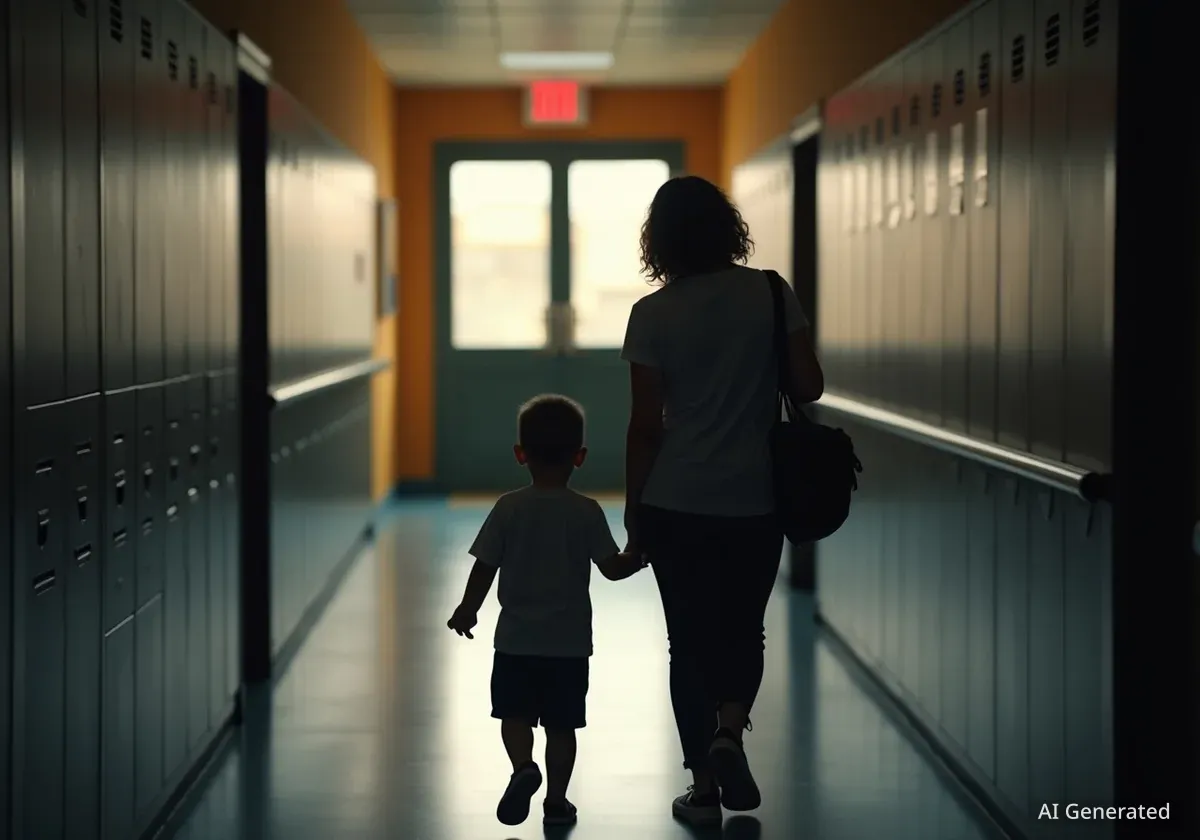A father in Lake Worth, Florida, is demanding accountability from the Palm Beach County School District after his 9-year-old son was subjected to hours of questioning by school officials and police regarding a threatening note he did not write. The father, Yunior Dopico, states that his son's rights were violated during the investigation at Panther Run Elementary School.
Key Takeaways
- A 9-year-old student at Panther Run Elementary was questioned for hours about a threatening note.
- The father, Yunior Dopico, alleges the school denied his son's requests to contact a parent.
- The student was later cleared after another child admitted to writing the note as part of an online game.
- The family is seeking an apology and changes to the school's investigative procedures to protect student rights.
Investigation into a Threatening Note
The incident began when a threatening note was discovered in another student's journal at Panther Run Elementary. This discovery prompted a school-level investigation that focused on Nathaniel Dopico, a nine-year-old fourth-grader.
According to the family, Nathaniel was removed from his class and questioned for an extended period by school administrators. His father, Yunior Dopico, expressed distress over the school's handling of the situation, particularly the decision to question a minor without parental notification or presence.
“When my son requested for me to be notified, or for his parent to be notified, two times at least they denied that request,” Yunior Dopico stated.
Nathaniel described the experience as intimidating. He said he repeatedly denied writing the note but felt pressured by the school principal.
“The principal kept telling me, I kept telling her that it wasn’t me. And the principal kept telling me be honest with me because I have cameras,” Nathaniel recounted.
Police Involvement and Miranda Rights
The situation escalated when school police became involved. Nathaniel was questioned by an officer while his older sister was present, as his parents were not available at the time. During this questioning, the officer read the nine-year-old his Miranda rights.
“He starts reading me the Miranda rights and asked if I need a lawyer, I said ‘No,’” Nathaniel said. Under what his father describes as immense pressure and fear, Nathaniel eventually admitted to writing the note, a confession the family says was false and coerced.
Parental Rights in School Investigations
The involvement of law enforcement in school disciplinary matters raises complex legal questions about student rights. While schools have a responsibility to investigate threats, the line between a school inquiry and a custodial interrogation by police is critical. The reading of Miranda rights typically signifies that an individual is in custody and being questioned for a criminal matter, a procedure that is particularly sensitive when applied to a minor.
Yunior Dopico firmly believes the school's actions constituted a severe overstep and a violation of his family's rights. “That’s a clear violation of parental rights,” he asserted, emphasizing that a child should not be subjected to such an interrogation without a parent or legal guardian.
Exoneration and School's Response
The investigation later took a turn when another student, accompanied by their parents, came forward and admitted to writing the note. In a letter sent to the Panther Run Elementary community, Principal Risa Suarez addressed the incident.
Suarez explained that the student who wrote the note clarified its context. According to the principal's letter, the note was related to an online game and was brought to school unintentionally. The letter aimed to reassure parents about the school's commitment to safety without detailing the specifics of the investigation process involving Nathaniel.
The Impact of False Accusations
Research indicates that false accusations and intense interrogations can have significant psychological effects on children, including anxiety, stress, and a loss of trust in authority figures. The developing nature of a child's brain can make them more susceptible to suggestion and pressure during questioning.
For the Dopico family, this resolution did not erase the harm caused. Yunior Dopico stated that the explanation provided by the school was insufficient to address the trauma his son experienced.
Lingering Trauma and Call for Change
The aftermath of the investigation has been difficult for Nathaniel and his family. His father reported that the nine-year-old has suffered from significant emotional distress since the incident.
“He had nightmares, I didn’t send him to school for a week, he was super nervous, anxious,” Yunior Dopico explained. He added, “No kid should go through this, this is unfair.”
The situation at school has also become challenging for Nathaniel. He reported being taunted by other students who are aware of the investigation. “Some kids from other classes calling me names, teachers checking on me like constantly,” he said.
A Father's Plea for Accountability
The Dopico family is now focused on ensuring no other child experiences what Nathaniel went through. Yunior Dopico is calling for a formal apology from the Palm Beach County School District and Panther Run Elementary. More importantly, he wants a fundamental change in how the school conducts investigations involving young students.
“Many things have been violated, and I think that justice should be done,” he said. “I definitely want to hold them accountable for what they did.”
The family hopes their story will prompt a review of district-wide policies to ensure that parental notification is a mandatory first step, not an afterthought, when students are questioned about serious matters, especially when law enforcement is involved.





